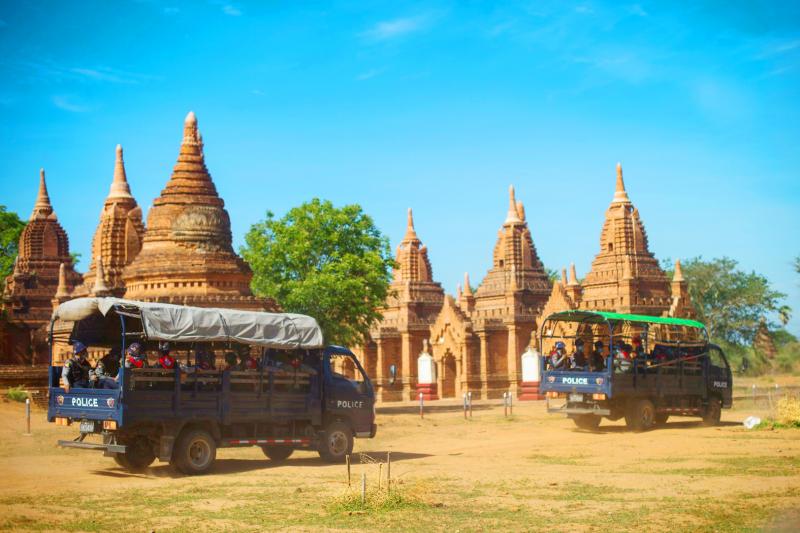A squad of gun-toting police officers patrolled Myanmar’s sacred site of Bagan under the cover of night, taking on plunderers snatching relics from temples forsaken by tourists due to COVID-19 restrictions.
Each evening as dusk falls, about 100 officers fan out across the plain of Bagan covering 50km2, sweeping flashlights over the crumbling monuments to scour for intruders.
“Our security forces are patrolling day and night,” Police Lieutenant Colonel Sein Win told reporters. “We have it under control for the moment, but it’s a challenge.”

Photo: AFP
The central Burmese city is strewn with more than 3,500 ancient monuments — stupas, temples, murals and sculptures — and was finally added to the prestigious UNESCO world heritage list last year.
However, the pandemic has stymied plans to capitalize on Bagan’s newfound status.
The dearth of visitors means temples and hotels lie empty, crushing the livelihoods of locals and opening doors to opportunistic burglars.
In a spate of break-ins across the holy site early last month, robbers looted 12 temples, swiping a range of relics, including copper stupas, ancient coins and jade jewelry.
The 35th Battalion regional police squad have been deployed to bolster local tourism police and firefighters, the teams ranging across the site by jeeps and motorbikes, and on foot.
“It’s not easy to patrol, as the area is so big,” one police officer said through his mask, worn by all on duty to protect against COVID-19.
They also need to be on their guard against the area’s numerous venomous snakes, he added, asking not to be named.
For now, the extra security seems to have thwarted any break-ins at the most prestigious temples. Some of the relics date back to the 11th to 13th century, an era when Bagan was the capital of a regional empire.
This is the first time in decades the site has been so seriously targeted, said Myint Than, deputy director of Bagan’s archeological department, as he showed at one stupa how the looters scaled the walls to enter from the roof.
“When there were tourists here, there were no burglaries,” he said, adding that he believes this is the work of outsiders.
Even if locals’ livelihoods have been devastated by the tourist downturn, he said he does not believe they would “betray their heritage.”
Times are hard in an area dependent on tourism.
Bagan welcomed nearly 500,000 visitors last year, while this year the figure was 130,000 up until the country’s New Year festival in April and much of the area has been closed to tourists since.
Hotels and restaurants lie shuttered, while the hawkers and tuk-tuk drivers not lucky enough to clinch rare construction or farming work wait in vain for customers among the deserted lanes connecting the temples.
Souvenir seller Wyne Yee, 46, said the money she makes in April alone usually keeps food on her family’s table for the following six months.
“But this year we have no money left,” she said.
She said she was saddened by the desecration of the temples, but — like others in the area — was convinced that a curse will see the crooks receive their comeuppance.
“The Bagan temples will not tolerate it,” she said. “The robbers will be dealt with.”

‘IN A DIFFERENT PLACE’: The envoy first visited Shanghai, where he attended a Chinese basketball playoff match, and is to meet top officials in Beijing tomorrow US Secretary of State Antony Blinken yesterday arrived in China on his second visit in a year as the US ramps up pressure on its rival over its support for Russia while also seeking to manage tensions with Beijing. The US diplomat tomorrow is to meet China’s top brass in Beijing, where he is also expected to plead for restraint as Taiwan inaugurates president-elect William Lai (賴清德), and to raise US concerns on Chinese trade practices. However, Blinken is also seeking to stabilize ties, with tensions between the world’s two largest economies easing since his previous visit in June last year. At the
Nearly half of China’s major cities are suffering “moderate to severe” levels of subsidence, putting millions of people at risk of flooding, especially as sea levels rise, according to a study of nationwide satellite data released yesterday. The authors of the paper, published by the journal Science, found that 45 percent of China’s urban land was sinking faster than 3mm per year, with 16 percent at more than 10mm per year, driven not only by declining water tables, but also the sheer weight of the built environment. With China’s urban population already in excess of 900 million people, “even a small portion

UNSETTLING IMAGES: The scene took place in front of TV crews covering the Trump trial, with a CNN anchor calling it an ‘emotional and unbelievably disturbing moment’ A man who doused himself in an accelerant and set himself on fire outside the courthouse where former US president Donald Trump is on trial has died, police said yesterday. The New York City Police Department (NYPD) said the man was declared dead by staff at an area hospital. The man was in Collect Pond Park at about 1:30pm on Friday when he took out pamphlets espousing conspiracy theories, tossed them around, then doused himself in an accelerant and set himself on fire, officials and witnesses said. A large number of police officers were nearby when it happened. Some officers and bystanders rushed

Beijing is continuing to commit genocide and crimes against humanity against Uyghurs and other Muslim minorities in its western Xinjiang province, U.S. Secretary of State Antony Blinken said in a report published on Monday, ahead of his planned visit to China this week. The State Department’s annual human rights report, which documents abuses recorded all over the world during the previous calendar year, repeated language from previous years on the treatment of Muslims in Xinjiang, but the publication raises the issue ahead of delicate talks, including on the war in Ukraine and global trade, between the top U.S. diplomat and Chinese